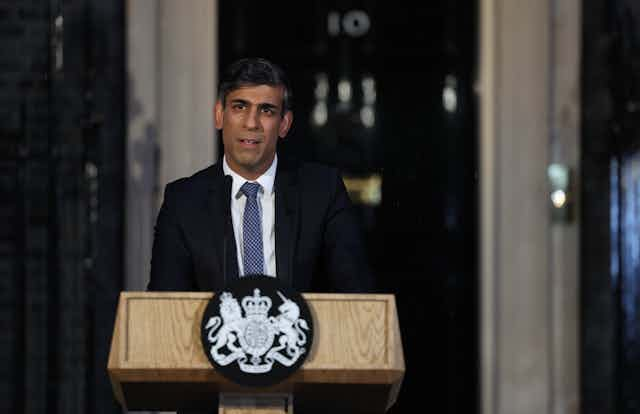When Rishi Sunak stepped outside 10 Downing Street to make a speech on March 1, he had knowingly fuelled speculation that he was about to call an election. Prime ministers who broadcast live to the nation at a lectern outside 10 Downing Street on a Friday night are generally about to make a big announcement.
Instead, Sunak delivered an address on political extremism. But rather than giving a balanced assessment of the extremism problem, the prime minister’s Downing Street speech seemed heavily slanted towards the Islamist variety. He said, for example, “we must draw a line” when protesters call for “violent jihad”. And rather than choosing to speak about conciliation or cohesion, he said we must “prevent people entering this country whose aim is to undermine its values”.
What few references Sunak made to the far-right threat were based on the flawed premise that it and Islamism are “two sides of the same extremist coin”. They are, in fact, separate and differentiated problems – and the far right increasingly trumps Islamism as a threat. More people are now referred to the government-run Prevent counter-extremism programme for worrying far-right views than Islamist views, for example.
Over the past ten years, the UK has seen significant shifts towards a more vocal form of far-right extremism – both in terms of ideas and political activism.
We have seen the rise of UKIP and its various successor parties. The party was initially conceived of as a mechanism to pressure the Conservative party into harder Euroscepticism but since its Brexit goal has been achieved, it has evolved into something else. Its focus now seems to converge on more radicalised forms of anti-Islam protests.
Recent polling suggests the right-wing Reform UK party is soaking up discontents on the Conservative party’s right flank and again resetting the party’s main agenda. Reform’s most recent defector from the Conservative Party is Lee Anderson, a former deputy chairman who says “Islamists have got control of our country” and that migrants should go back to France.

There has also been a worrying rise in far-right terror attacks in the past decade. Most infamously, Thomas Mair murdered Labour MP Jo Cox in June 2016 and Darren Osborne attacked a mosque in Finsbury Park in June 2017. There have been several other far-right terror plots since that haven’t made the headlines.
Tolerating the intolerant
With this far-right shift and concerns over increasing Islamist extremism in reaction to the Gaza conflict, one of the serious tasks now facing us as democrats is how to respond to political extremism.
To what extent should we tolerate the intolerant within liberal democracies? How do thresholds, enacted in policy and law, between unpalatable views and dangerous actions look in concrete reality when dealing with political extremism? And how should our leaders and the police respond to extremists when they are found to be operating in a specific town or city?
Published in 2018, my book and research has tried to shed light on some of these questions. One of the first comprehensive surveys of far-right counter tactics in the UK, it looked at how mainstream politicians have tried to deal with anti-Islam street movements, the EDL and Britain First.
Looking at specific cases in Birmingham, Bradford, Luton, Leicester and Tower Hamlets, I found that local politicians successfully used counter tactics to curtail the divisive and disorderly aspects of these protests. These were mainly exclusionary tactics – placing restrictions on the locations of protests, the groups themselves and the movement of individuals.
One particular challenge was how local folklore or rumours were seized upon by both the mainstream, including the media, and extremist groups.
In Tower Hamlets, for example, the normalisation of the narrative that Islamist extremism is rife in the borough and that there are “no-go zones” for anyone other than Muslims saw the area being keenly targeted by the far right.
In Leicester, it was rumours that the EDL were planning to attack a mosque (and the subsequent counter-reactions to this) that needed to be addressed when far-right mobilisations became apparent. Indeed, “cumulative extremism” can be as much of a problem as extremism itself.
This type of situation should be something that is keenly avoided in the government’s approach to extremism now, if it does truly believe, as Sunak suggested, that Islamist extremism is on the rise as part of Gaza protests.
The main argument of my book is that an “inclusionary turn” is needed when dealing with any hue of “extremist” protest. Building on Ami Pedahzur’s (2004) notion of an “immunised” democracy, I subscribe to the notion that better cross-community contact, grassroots educational initiatives against prejudice and a re-engagement between politicians and disaffected constituencies are all important preventative methods when dealing with political extremism.
Such basic everyday measures are needed to build a broader civic movement against extremism in the years and months to come. This might, for example, include mainstream politicians and police visiting local communities that have heightened concerns around protests to liaise with them and listen to them. It might mean paying greater attention to extremist myth-making online.
As democrats, we need to make sure that our responses are not based on the stigmatisation and racialisation of others. Extremism is a multifaceted threat that can feed off of grievances and animosities – both real and imagined.
It is incumbent on us to have a realistic sense of the threat because how we perceive and deal with intolerant people in our society has important implications. Why? Because it has a bearing on who we are and how we function as a democracy.

